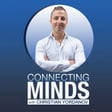
This One Habit Will Transform Your Life w/ Nick Hutchison
Are you following health trends that actually harm your body? In my eye-opening masterclass "The 7 Popular But Deadly Health Fads," I reveal how common health practices promoted by influencers and gurus might be ravaging your gut, accelerating disease, and shaving years off your life.
Discover which popular diets, supplements, and health rituals are secretly sabotaging your health and learn what to do instead. I explain why these seemingly healthy habits are damaging your body and provide actionable alternatives for true longevity.
Register for free access to this essential health information at https://www.livelongerformula.com
---
Nick is the founder of Bookthinkers and author of the book Rise of the Reader. We discuss strategies to get the most out of our precious reading time.
His book, Rise of the Reader: https://amzn.to/3X7UQX2
Instagram: www.instagram.com/bookthinkers
Nick's Instagram: https://www.instagram.com/nicklovesbooks/
Website: https://www.bookthinkers.com/
